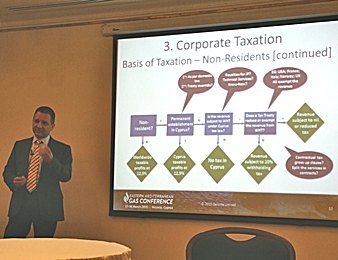EMGC ’15: Deloitte tax experts dissect regulatory laws for Cyprus gas
3/18/2015 12:00:00 AM
By ADRIENNE BLUME
Managing Editor
NICOSIA, Cyprus -- Day 2 of Gulf Publishing Company's third annual Eastern Mediterranean Gas Conference (EMGC) opened with a breakfast workshop sponsored by Deloitte. The workshop covered tax and regulatory considerations for the Cyprus gas market.
The workshop included perspectives from Deloitte partners George Pantelides, Head of Consulting Services and Oil and Gas Specialist; Pieris Markou, Head of Tax and Legal Services and Oil and Gas Tax Leader; Nicos Papakyriacou, Partner in charge of Nicosia Office and Oil and Gas Leader; and Christos Papamarkides, VAT Leader and Oil and Gas Specialist.
 Tax considerations for Cyprus energy sector. Pantelides (pictured) discussed the tax and value-added tax (VAT) aspects of doing business in Cyprus. He asserted that Cyprus is an interesting location from which to operate because it is part of the EU and is strategically located at the center of the developing Eastern Med energy industry. The country's legal system is based on the UK's legal system, and it contains one of the best tax systems in the EU, according to Pantelides.
Tax considerations for Cyprus energy sector. Pantelides (pictured) discussed the tax and value-added tax (VAT) aspects of doing business in Cyprus. He asserted that Cyprus is an interesting location from which to operate because it is part of the EU and is strategically located at the center of the developing Eastern Med energy industry. The country's legal system is based on the UK's legal system, and it contains one of the best tax systems in the EU, according to Pantelides.Cyprus is also friendly to international investors. A corporate income tax rate of 12.5% is in force, but this excludes dividend income, profits on disposal of securities, overseas branch profits and profits from the disposal of immovable property outside of Cyprus. A unilateral tax relief is also available, and no withholding taxes or controlled foreign company rules are in force. Interest deductibility is available without restrictions.
There is no specific tax regime for companies operating in the oil and gas industry; rather, taxes are based on general tax rules for companies. Income is taxed on an accrual basis. Also, special rulings are available for plant and machinery rates.
Additionally, the Cyprus government is seeking to make certain expenses deductible for energy firms, such as seismic survey costs, exploratory costs, drilling costs, dry hole/decommissioning costs, capitalization of general administration costs, capital allowance rates and signature bonuses.
Value-added tax rules. Cyprus' VAT is harmonized with EU VAT legislation. VAT is chargeable on any local supply of goods and services made by a taxable person in the course of business, the import of goods from the EU, and other actions.
A business is obliged to register for Cyprus VAT if the value of its taxable supplies for the last 12 months exceeds the registration threshold of €15,600, or if it is expected that taxable supplies in the next 30 days will exceed €15,600. Input VAT is incurred on local supplies of goods and services, on import of goods from EU countries and on the application of the reverse-charge provisions on services received from outside Cyprus.
Oil and gas export rates for VAT dictate that the supply of hydrocarbon products by an operator within Cyprus must be subject to VAT at the standard rate. Supplies of goods to be admitted into Cypriot waters that are to be incorporated into drilling or production platforms for maintenance repair, construction, alteration or fitting are subject to a zero-VAT tax. Also, goods and equipment to be transported directly to drilling platforms are not subject to customs tax.
Maximizing human capital. Next, Markou talked about human capital services in the Cyprus energy sector. As of January 2015, 16.1% of Cyprus' population was unemployed—a very high percentage, which the government is working to reduce.
Employment terms for reputable organizations in the oil and gas sector are favorable and go "over and above the legislative requirement," Markou said. Local employment laws tend to rule in favor of the employees. Cyprus also plans to offer specialized courses for blue-collar workers in the energy sector to increase employment in the industry.
Lastly, to increase energy-sector employment in Cyprus, the government is encouraging the transmission of knowledge and expertise to the local workforce with the help of specialized and highly skilled individuals who gained their oil and gas work experience overseas.
Stay tuned for more news from EMGC 2015.






Comments